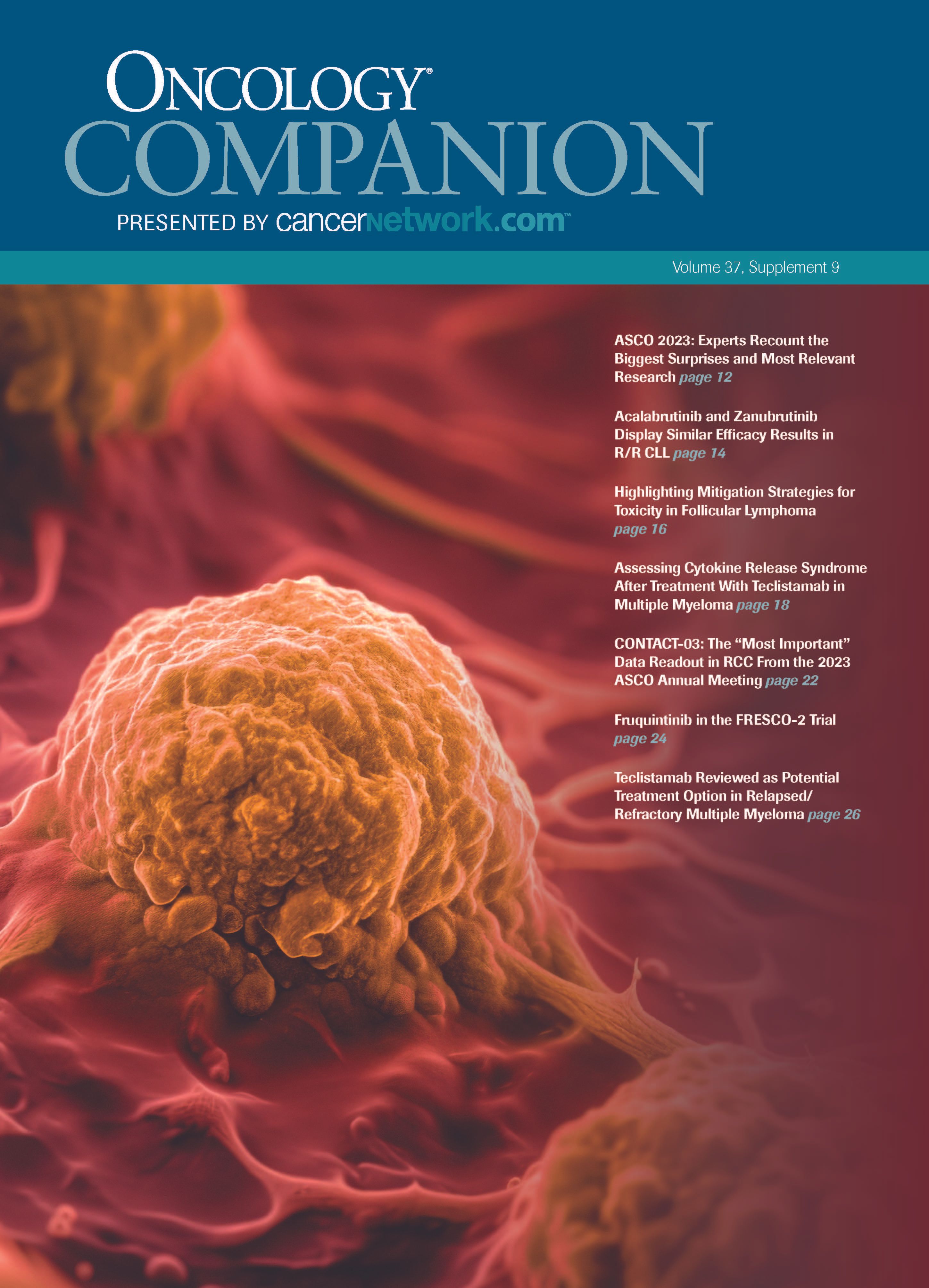CONTACT-03: The “Most Important” Data Readout in RCC From the 2023 ASCO Annual Meeting
Robert Motzer, MD, led an expert panel to discuss the phase 3 CONTACT-03 which examined patients with renal cell carcinoma.
Robert Motzer, MD, led an expert panel to discuss the phase 3 CONTACT-03 which examined patients with renal cell carcinoma.

During the 2023 American Society of Clinical Oncology (ASCO) Annual Meeting, a panel of experts gathered to discuss findings from the phase
3 CONTACT-03 trial (NCT04338269), which assessed atezolizumab (Tecentriq) plus cabozantinib (Cabometyx) vs cabozantinib alone in patients with renal cell carcinoma (RCC).1 The trial demonstrated no improvement in outcomes with the experimental regimen, and the panel mulled over the implications of these negative findings.
All patients enrolled in CONTACT-03 received oral cabozantinib at a dose of
60 mg once daily; those in the experimental arm additionally received intravenous atezolizumab at a dose of 1200 mg every 3 weeks. The randomized, open-label trial included 522 patients with locally advanced or metastatic RCC who experienced progression on prior immune checkpoint inhibitor (ICI) therapy. Most of the population (77%) were men.
The atezolizumab arm had a median progression-free survival (PFS) of
10.6 months (95% CI, 9.8-12.3) as compared with a median of 10.8 months (95% CI, 10.0-12.5) in the cabozantinib-alone arm (HR, 1.03; 95% CI, 0.83-1.28; P = .78). Median overall survival was 25.7 months (95% CI, 21.5–not evaluable [NE]) in the experimental arm and was NE (95% CI, 21.1-NE) in the control arm (HR, 0.94; 95% CI, 0.70-1.27; P = .69). In both groups, 34% of patients died.
The rates of confirmed objective response were 40.5% (95% CI, 34.5%-46.8%) with the combination regimen and 40.9% (95% CI, 34.8%-47.3%) with the control regimen, as of the presentation of these data.
Serious adverse effects (AEs) occurred in 48% of those treated with the combination and 33% of those treated with cabozantinib alone. AEs leading to death occurred in 6% and 4% of patients in each respective arm.
Ornstein: This trial was a real highlight in the RCC field at the 2023 ASCO Annual Meeting. We know most patients with clear cell RCC will receive an immune-based therapy as their initial regimen, or even in the refractory setting. The question has been whether there’s a role for immunotherapy-based treatment in patients whose cancer progressed on an ICI.
One of the interesting findings from this study [was that] the objective response rates for both arms were very similar, [at approximately 40%]. It was impressive to see cabozantinib perform so well in a refractory setting.
[Additionally], whether patients got cabozantinib or cabozantinib plus atezolizumab, there seemed to be good [disease] control overall, with progressive disease as the best response in only 4% or 5% of patients in both arms.
This trial confirms my clinical practice, which is not to use an immune-based therapy in patients whose cancer has recently progressed on an immunotherapy-based combination. When I see a patient who has disease progression after nivolumab [Opdivo] or axitinib [Inlyta] plus pembrolizumab [Keytruda]—or even if they received a tyrosine kinase inhibitor [TKI] followed by nivolumab monotherapy—I would not follow that with another immune-based regimen. The standard of care is to give that patient a TKI monotherapy. Based on these data, it appears that cabozantinib would be a reasonable approach, given the response rate of 40% in this setting and the
PFS [benefit].
Motzer: One of the concerns [about this trial] is that atezolizumab may not be the most active of the ICIs and may be less active than PD-1 inhibitors. Might that have impacted these findings?
Rini: There’s definitive clinical data that PD-L1 inhibitors are less active, and that could be at play here. The phase 3 TiNivo-2trial [NCT04987203] will assess tivozanib [Fotivda] plus nivolumab vs tivozanib alone, which will [further] answer this question—at least in part. Is a mechanism issue at play here? I don’t think so. The cabozantinib monotherapy arm performed very well in this trial; those are almost frontline numbers. We have 40% response rates and a PFS of [more than] 10 months.
I’d hypothesize 2 reasons why [we saw these results]. One is that ICI therapy had to be the most recent therapy [among these patients], so those [prior] drugs, or their T-cell effects, probably lingered. The arms may have been very similar in [this respect]. Also, the patients who entered this trial are, by definition, those who are less immune responsive. As such, you’re weeding out all the immune-responsive patients, and you’re likely left with a very enriched angiogenic cohort. This is just hypothetical; we don’t have biological data yet. However, that may be why you see high response rates in the cabozantinib arm, and why it would be hard to show a difference with the addition of immunotherapy, which is the difference between the arms.
This was the most important data at ASCO this year, even though it was negative, because this [regimen] was [being used] in practice based on prior retrospective experiences. We always need to be careful about [drawing conclusions from] anything short of a randomized trial. We don’t always have randomized data, but we need to be careful about implementing treatments in practice for which we don’t have randomized data. This is a good example [of why].
One thing [this trial] doesn’t answer is the question: What if there was a longer gap between immunotherapies? There was only 1 patient who’d received adjuvant pembrolizumab on each arm in this trial, based on the timing of accrual, but what if a patient experienced failed therapy with adjuvant pembrolizumab, or completed their treatment 3 years prior? We don’t have those [types of] patients yet, of course, [except for those] who were on the trial. What if a patient received immunotherapy in the front line and you’re now talking about the fifth-line therapy? I don’t think this trial answers that question [either], although the burden of proof is on proving that it works, not proving that it doesn’t. I wouldn’t [use this regimen that way] in practice until there’s proof that it works.
Reference
- Pal SK, Albiges L, Tomczak P, et al. Atezolizumab plus cabozantinib versus cabozantinib monotherapy for patients with renal cell carcinoma after progression with previous immune checkpoint inhibitor treatment (CONTACT-03): a multicentre, randomised, open-label, phase 3 trial. Lancet. 2023;402(10397):185-195. doi:10.1016/S0140-6736(23)00922-4
EP: 1.Lenvatinib Plus Pembrolizumab Versus Sunitinib in Patients With Advanced Renal Cell Carcinoma (aRCC)
EP: 2.Pembrolizumab Plus Axitinib Versus Sunitinib for First-Line Treatment of Advanced Clear Cell RCC
EP: 3.Comparing IO/TKI and IO/IO First-Line Treatment Regimens in Advanced RCC
EP: 4.Selecting an Appropriate Frontline Treatment Regimen for Patients With Advanced RCC
EP: 5.Treating Patients With Metastasized RCC
EP: 6.Managing Adverse Events in Patients With Advanced RCC Receiving an IO/TKI Combination Regimen
EP: 7.Atezolizumab Plus Cabozantinib Versus Cabozantinib Monotherapy for Metastatic RCC
EP: 8.Emerging Advancements in the Treatment of Clear Cell RCC
EP: 9.Recent Data Updates in the Treatment of Non-Clear Cell RCC
EP: 10.Cabozantinib Plus Nivolumab and Ipilimumab for Advanced Non-Clear Cell RCC
EP: 11.CONTACT-03: The “Most Important” Data Readout in RCC From the 2023 ASCO Annual Meeting
